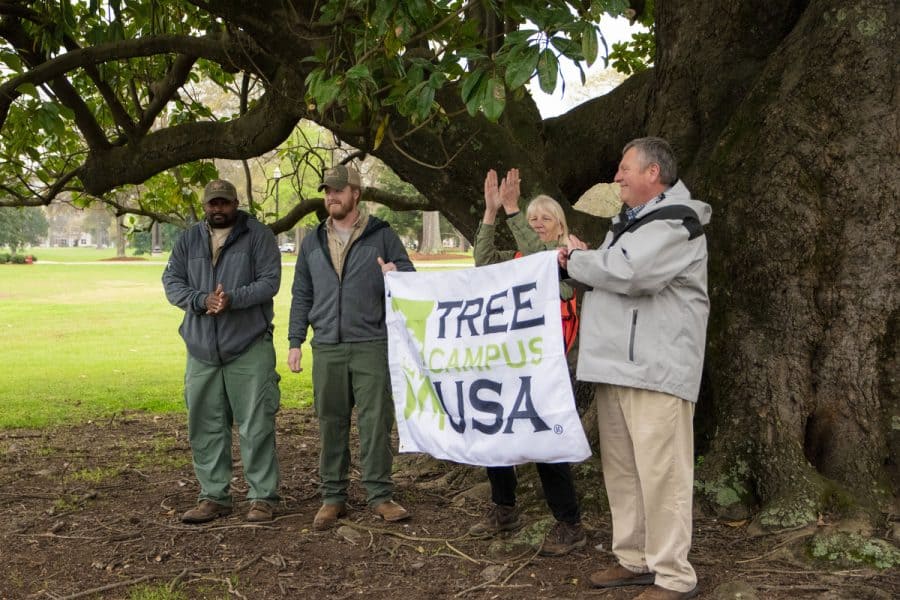University named “Tree Campus USA” by Arbor Day Foundation for eighth consecutive year
March 19, 2023
The University of Alabama hosted an event on March 9 on Bryce Lawn in partnership with the Alabama Forestry Commission wherein the commission measured the dimensions of a particularly large southern magnolia tree to determine if it is the largest of its species in the state. The event also served as an announcement of the University being deemed a “Tree Campus USA” by the Arbor Day Foundation for its tree conservation efforts.
Champion Tree Measurement
Launched by the AFC in 1970, the Champion Tree Program is designed to “discover, recognize, and preserve the largest of each native tree species in Alabama,” with an honorary plaque being placed at the base of the winning tree and certificates given to the owner and the individual who nominated the tree for consideration. According to the AFC, honoring special trees through the program promotes the value of trees and ensures the record-breaking plants are preserved for future generations.
The over 100-year-old southern magnolia tree on Bryce Lawn, one of over 75 large tree species found on campus, certainly seemed to break records.
“What we measure [in the competition] is the circumference in inches, the total height in feet, and then the average spread of the crown from tip to tip,” said Katie Wiswall, AFC urban & community forestry partnership coordinator.
Over 25 attendees watched as Wiswall, with the aid of two student volunteers, measured these metrics and determined that the tree had a trunk circumference of 292 inches, average crown spread of 72 feet and a height of 70 feet. Using a specific formula designed by the American Forests non-profit organization, Wiswall awarded the tree 380 points in the competition.
The competition, however, will not end until August.
“When classes start back next year, we should know for sure that this is or is not the state champion. I suspect it will be,” Wiswall said.
If designated the “Champion Tree,” the Southern Magnolia will join another Champion Tree on Bryce Lawn: a Chinese pistache gifted to the University by Queen Victoria of England in the 1850s that is likely the oldest living of its species. The AFC bestowed the tree’s title in 1980.
Tree Campus USA Announcement
In conjunction with the measurement of the magnolia was a formal announcement by Wiswall and Bonner Lee, a landscape architect of University Lands of the Arbor Day Foundation, designating the University as a “Tree Campus USA” for 2022.
The Arbor Day Foundation is a national non-profit dedicated to conservation and expansion of forests that recognizes accredited colleges and universities that make a commitment to expand community forests and tree coverage on campus, maintain healthy campus trees and educate students and community members about the importance of conservation and environmental sustainability. Over 400 campuses have been recognized so far.
“The University of Alabama has completed the necessary steps to be recognized as a Tree Campus by the Arbor Day Foundation,” Wiswall said. “In order to be recognized as a Tree Campus, [a campus must] have a tree care management plan that’s extended campus-wide, which [UA does]. [A campus must] have a student learning activity every year for students about trees. … [The upcoming activity] will be [in] 2023. And then, [a campus must] have some sort of an Arbor Day celebration on campus.”
Additionally, the non-profit requires establishment of a campus tree advisory committee to work with appropriate campus grounds officials to “assist in providing guidance for future planning, approval of a comprehensive campus tree plan education of the campus population as to the benefits of campus trees and development of connectivity to the community.” The institution must also provide evidence of dedicated annual expenditures toward its tree program..
Lee said the recognition showed all the work the University puts into ensuring the health and safety of the campus forest.
By doing all this work, the Arbor Day Foundation says, campuses can reduce energy consumption, combat climate change, boost student mental health and educate future generations about the significance of environmental responsibility.
In 2018, the University established its “Landscape and Grounds Strategic Plan” for maintaining and improving campus landscaping, a document which also discusses reasons for the University to pursue initiatives such as becoming a Tree Campus USA..
“A well cared and properly maintained campus … is critical to recruiting students. … Sixty-two percent of high school seniors make their choice of institution based on the appearance of the campus buildings and grounds,” the Plan outline said. “The beauty of this campus also translates into an incredible recruitment tool to attract … quality faculty and staff.”





















